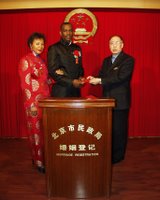

After spending a month in Beijing, I was secure in the knowledge that yes, this was to be my new temporary home. I headed back to the U.S. to figure out what we needed to do about getting married, quit my job and prepare for an extended stay overseas.
The first (short-lived) plan was for us to wait until he could return to the U.S. without suffering the tax consequences – this meant staying outside America for 330 consecutive days. We quickly decided we did not want be apart for that long. Another consideration was if we were not married and I returned to China, I could only stay for the length of a tourist Visa.
I returned to China a month later without a solid plan for this wedding. After spending hours on the Internet and making phone calls and trips to the U.S. Embassy in China, we found out that we actually could get married in China! As long as one of the couple was authorized to work in China, we were good to go. This, as it turns out, was a well-kept secret.
I found a tailor and had my wedding dress custom made. Ken also had a mandarin style jacket made. The ceremony itself was conducted completely in Chinese, although they did have us walk in on the traditional wedding march. It was conducted at the Chinese marriage bureau – much like the local City Hall. Our Best Man/Translator was our Chinese driver Benny. We filled out some paperwork, went through the ceremony, took pictures and we were married in under an hour. So, while we could not understand what was being said, it was a very special day for us. Our original marriage certificate is written in Chinese and bound in a red silk book. Of course we had to have it translated into English at the Embassy.
That evening we had a small reception with our friends at the apartment building. True to our nontraditional selves, we had our honeymoon in Viet Nam. When the travel agent made the suggestion, the first thing I thought was, “You’re suggesting we go where?!” Sounds familiar. Anyway, we flew from Beijing to Hanoi then to Ho Chi Minh City (formerly Saigon). We spent the night in Ho Chi Minh then a driver took us to our resort in Phan Thiet – about a four-hour drive.
I was pleasantly surprised with Viet Nam. The streets were nicely paved, lots of freestanding stores and our hotel in Ho Chi Minh was truly five-star. Phan Thiet is a resort town located on the edge of the South China Sea. Although the resort was about 20 kilometers from the water’s edge there was not much swimming and certainly no diving or snorkeling. Lots of skydiving and parasailing. The resort was “quaint” in an Asia sort of way – individual bungalows with a small front porch and the basic necessities. Meals at the resort were pretty average but much better in town. We found a restaurant where the seafood was plucked fresh from the sea – now that’s the way to eat shrimp.
Phan Thiet is not a place to go if you want an action-packed vacation. It was relaxing and the air was clean. We did a lot of walking and just hanging out by the pool. I was surprised that most of the locals spoke English quite well – better than most of the Chinese we ran into at home. We did an island tour and had a run in with a local scam artist but came away from it unscathed. The main mode of transportation in Viet Nam seems to be motorbike. We rented one and zipped around the island for a day. By the end of our honeymoon we felt we’d seen all there was to see in Phan Thiet and headed back to China.


















